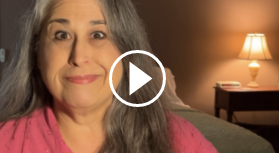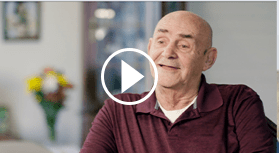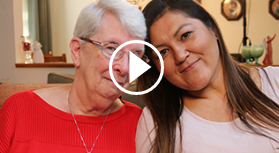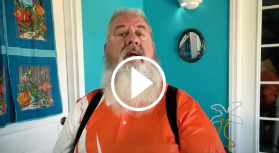My name is Sharon. I have been diagnosed with CLL/SLL, and I was diagnosed in 2021, although I think I may have had it longer, but didn't realize it
My symptoms were first of all a lump in my neck that I saw my general practitioner about. And he said it could be something, or it might just go away, so come back in three months, which I did.
And then he had me take a lot of blood work and called me that evening and said that he thought I had leukemia
I was somewhat slow to react when I got the diagnosis, probably because my mother had always told me she had leukemia and she never had any problems with it. Never complained about feeling any different. So I figured I'd be the same. So I didn't really worry about it at all and then later on when I started reading about it and then realizing I had symptoms that my mother never had, then I started to get a little more concerned.
When I first got the diagnosis, I did go to my oncologist. He's a very kind of laid back kind of guy doesn't get too excited. So I thought, okay, well he knows what he's talking about. He doesn't seem overly concerned. And he told me that we would watch it for a while and see if there were any changes. He saw me every month and after a couple of months, my swelling had increased in my neck. I had several lumps. I had lumps under my arm, both arms, and they were kind of sore and I was starting to feel uncomfortable and I was tired, but I figure I'm not a youngster anymore. So being tired is not unusual. And then I was having monthly blood draws, testing my white count and it kept going up and it went up pretty high. He said, it's time to start you on treatment.
And then he told me all about the kind of treatment he was going to suggest and said it was a pill form, which I liked. Said, I probably wouldn't lose my hair, which I really liked. He said I would take it twice a day and that there were side effects, and he told me what they were but they shouldn't last very long, the more common ones. And so I said, great, let's go for it. So that's what we did.
Rob:
And my initial background was in the pharmaceutical business. So I had an idea of terminology, the language they use and what would be red flags to me […] And everything that I was able to see about it, and I felt comfortable with the way the doctor was dealing with it.
Sharon:
Looking back, I'm very glad he chose it. He did tell me, I'm sure he told me, that there were other things we could do, but the fact that he felt that was the best route for me, and it sounded pretty easy, so that's what we did.
Rob:
Yeah. So, often we've known so many people down through the years, various diagnosis. And I can remember on several occasions in those kinds of discussions and seeing people just totally shut down, like their life has ended. And then I've seen the other side of that too, where folks will have a dreadful diagnosis, but yet they'll do what they can to make the best of it and go on. They don't give up. They don't dig a hole or go into a dark room.
They live their life as well as they're able to. In this case with the treatment that Sharon is getting, it allows her to do a fair number of things that other folks with other treatments or other diseases aren't able to do.
Sharon:
Living with CALQUENCE now is so simple. My only problem is just paying attention when it's time to take it. Because I've set my phone to have an alarm at nine o'clock and nine o'clock, 9:00 AM and 9:00 PM.
But sometimes in the evening, we'll be watching a program and there'll be something really good going on, so I'll turn it off. Then I have to remember, oh, I got to go take my pill. So really right now it's fine.
The first couple of weeks though I had headaches and the doctor said they would be temporary. I only seemed to have them at night and actually, But they weren't real, real bad, but if they felt like they were going to keep me from being able to go to sleep, I could just take an over-the-counter. Acetaminophen is what I took, and it worked fine.
I might have had a little more bruising, but I think that's partly the disease and not the medicine, but I'm doing fine.
When I started the CALQUENCE, my neck was full of lumps and they slowly went down. The lumps under my arms slowly went away and my numbers immediately started dropping, the blood counts that were so high. I started feeling better right away. It took several months, probably, maybe nine before my counts were totally normal again.
I'm able to do everything I want to do. There might be a time or two that I get tired and I allow myself to do that
I think I had more energy and the lumps went down. And to me, that was proof that something was happening in a good way. And then I had monthly blood work and they showed the blood counts going down, which was the right direction, and that was encouraging. So living with CALQUENCE has been a breeze. I feel good.
I've been on CALQUENCE now... It'll be a year next month. And I can't even tell that I have a disease anymore.
Well, when I was first diagnosed, I did want to talk to somebody else that had had CLL. And I knew a woman at our church that has it. So between that, and then my own internet search, trying to use reputable sites, I felt like I knew pretty much what to expect.
And then that kind of calmed me down and made me realize that this was going to be okay. It's treatable. It may not be totally curable at this point, but it's treatable, So that was a good thing
If I met someone that had just been diagnosed with CLL, I would tell them my experience because I think that might give them a little more hope. I would tell them to, if they can, try to not panic and to calm down, because if you get yourself down in a depression it's really hard to get up. Just to encourage them to listen to their doctor, ask lots of questions. I used to go to the doctor with a list of questions so I wouldn't forget. I think that helped also.
Rob:
I think really the primary advice I would give is that this is treatable. So don't really go into that downward spiral of, "This is the worst thing in the world that could happen to me," because it's not.
Sharon:
We have two children and five grandchildren that I dearly love. I enjoy people. I enjoy getting out with friends. I also enjoy reading.
I'm in three book clubs, which may be too many, but I enjoy reading, knitting, scrapbooking.
I'm in a lot of committees and things at our church, but try to stay busy and enjoy life.
Select Safety Information
CALQUENCE is a prescription oral treatment for adults with chronic lymphocytic leukemia or small lymphocytic lymphoma. May cause serious side effects including: serious infections, bleeding problems, decrease in blood cell count, new cancers, and heart rhythm problems. Some may lead to death. Tell your doctor if you experience infections such as flu-like symptoms; unexpected bleeding such as blood in your stool or urine; or heart rhythm problems such as fast or irregular heartbeat. Use sun protection when outside.
Please see accompanying full Prescribing Information, including Patient Information.















 This product information is for US residents only.
This product information is for US residents only.